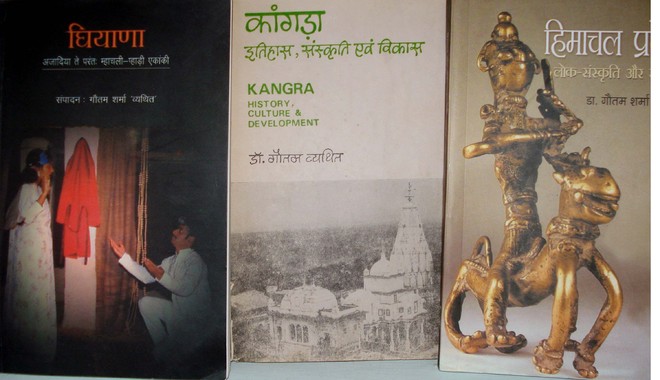Dr Vyathit is Dr Modest
Shriniwas Joshi
The common quote written on the walls of the schools is: “A tree bends when it is full of fruits; a fresh water cloud hangs low; similarly a man becomes all the more humble with accomplishments.”
This is true of Dr Gautam Sharma Vyathit. He shared the prestigious Sahitya Academy Award – Bhasha Samman-- in 2007 with Dr Pratyush Guleri for his exemplary contribution to the Himachali language and literature. This national-level award made him more modest. He carries Sahitya Sodh Samman, Himachal Kesari Samman, Rashtra Bhasha Rattan Samman, Maha Punjab Sanskriti Samman and many more on his head with dignity and in an unassuming manner. He was in Shimla recently (See photo) to take part in a seminar on "theatre" organised by the State Academy of Art, Language and Culture.
He is an authority on folk-theatre, especially that of the Kangra region but his book "Ghiana", which means a fire lit in the open for warmth, contains 22 pahari plays written by playwrights from all corners of the state.
Besides several books to his credit (See photo), his greatest contribution has been to promote and popularise "Jhamakara" folk-dance and bring it to the stage from the closed doors of a ready-to- wedding house. Earlier, women used to have festivity in the house and sing "Jhamakara" cutting jokes on the relatives of the bride and the bridegroom, “Jhamakarya! Jhamakarya! / Naanu nangaa aayaa Vo Jhamakarya-Jhamakarya” on the night of the departure of the baraat.
Vyathit choreographed the dance which, today, is one of the popular folk-dances of Himachal Pradesh and Kangra women breaking the age-old shackles perform it with gay abandon. He constituted "Kangra Lok Sahitya Parishad" in 1974 at Nerti as founder director and organised women-groups to initiate their way to the stage for public performances.
Offshore it struck a chord with the populace of West Germany and England and in India; "Jhamakara" is enjoyed all over. No doubt, his book "Himachal Pradesh – Lok Sanskriti aur Sahitya" published first in 1980 by the National Book Trust is in its fourth edition in 2012.
Gautam was born to parents late Faquir Chand and late Sheela Devi on August 15, 1938, at historic Nerti village of Shahpur tehsil in Kangra district. He still lives there. Why did I call Nerti historic? It is the only village in Kangra district and one of the 12 villages included in "Har Gaon ki Kahani" brought out by the Government and the gist of the plaque installed here discloses that till 1794, Nerti village, 24 kms from Dharamsala, was in Chamba state. On the 7th of Ashadh (June/July), 1794, there was a fierce battle between Prince Sansar Chand of Kangra and Prince Raj Singh of Chamba. It is said Raj Singh continued fighting the battle for two-and-a-half ghari (48 minutes) without his head. Raj Singh’s son built a Shiva temple in 1796 at the place his father was martyred. It was called Dehra then.
In 1980, it was renamed Nertiand is popular today as such. Nerti, even prior to the Independence,was home to cultural activities. The two reputed sitar players Ramzaan Mohammed and Faquir Mohammed and Pandit Dina Nath, narrator of scriptures and musician of standing, belonged to the village.
With the formation of "Kangra Lok Sahitya Parishad" in November 1974, the place has started humming with literary and cultural activities and the motivating force behind it is Dr Gautam Vyathit who has donated 1,500 plus books to the parishad to be used as library for the common man and has developed an open air theatre where about a thousand people can sit and enjoy the proceedings.
Today, Vyathit, which means ‘pained’, who did his primary schooling from here, matriculation from Rait and then pursued education on his own wings, topping it by crowning himself in 1974 by being the first ever PhD from Guru Nanak Dev University with the topic "Literary evaluation and critical analysis of Kangri folk songs" must have forgotten all pains to see his village developing, modernising and well connected to the towns nearby. Is it not the time that he changes his penname to ‘prafullit’ (happy) from ‘vyathit’?
Tailpiece
“I had rather be first in a village than second at Rome.” – Julius Caesar









